 Petzlover
Petzlover Briquet Griffon Vendeen is originated from France but St. Bernard is originated from Switzerland. Briquet Griffon Vendeen may grow 16 cm / 6 inches shorter than St. Bernard. Briquet Griffon Vendeen may weigh 66 kg / 145 pounds lesser than St. Bernard. Briquet Griffon Vendeen may live 4 years more than St. Bernard. Briquet Griffon Vendeen may have less litter size than St. Bernard. Both Briquet Griffon Vendeen and St. Bernard requires High Maintenance.
Briquet Griffon Vendeen is originated from France but St. Bernard is originated from Switzerland. Briquet Griffon Vendeen may grow 16 cm / 6 inches shorter than St. Bernard. Briquet Griffon Vendeen may weigh 66 kg / 145 pounds lesser than St. Bernard. Briquet Griffon Vendeen may live 4 years more than St. Bernard. Briquet Griffon Vendeen may have less litter size than St. Bernard. Both Briquet Griffon Vendeen and St. Bernard requires High Maintenance.
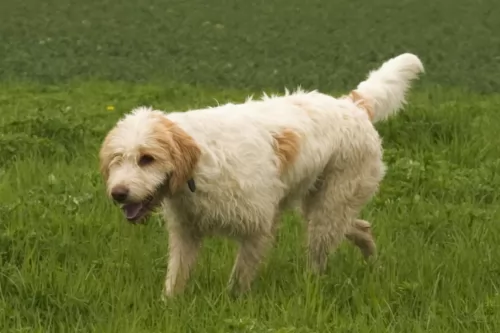 The Briquet Griffon Vendeen, a product of France is a hunting down bred down from the Grand Griffon Vendeen. The two dogs are descendants of the Gaul’s Canis sequsius and the Gris de St. Louis hounds. They are one of four dogs with rough coats from the Vendeen area along France’s west coast. Many of these lines were decimated by the Second World War and are still not found in France today.
The Briquet Griffon Vendeen, a product of France is a hunting down bred down from the Grand Griffon Vendeen. The two dogs are descendants of the Gaul’s Canis sequsius and the Gris de St. Louis hounds. They are one of four dogs with rough coats from the Vendeen area along France’s west coast. Many of these lines were decimated by the Second World War and are still not found in France today.
The Briquet Griffon Vendeen survived the war due to a French dog show judge named Hubert Dezamy, who restored the breed and it is mainly a show dog today. Many of Frances royalty prior to the French Revolution favored the breed as show dogs as well. The Briquet was originally developed for hunting of smaller game and is a scent hound. The larger Grand Griffon Vendeen was used in the hunt for large game, namely wolves and boar.
The Briquet Griffon Vendeen is recognized by the UKC and the FCI but not by the AKC and the breed is hardly known outside of France
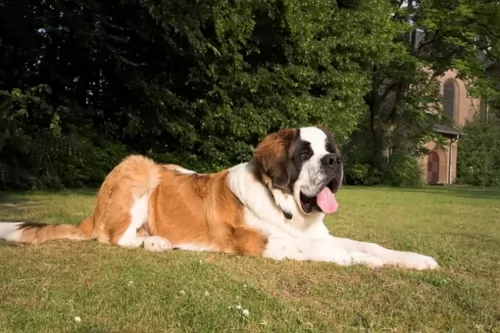 The St Bernard breed was once called the Alpine Cattle Dogs or the Alpine Mountain Dogs. They have always been farm dogs and mountain dogs in the French and Swiss Alps. They come from the border land of Switzerland and France. They were herding dogs, hunting, search and rescue, watchdogs and draft dogs.
The St Bernard breed was once called the Alpine Cattle Dogs or the Alpine Mountain Dogs. They have always been farm dogs and mountain dogs in the French and Swiss Alps. They come from the border land of Switzerland and France. They were herding dogs, hunting, search and rescue, watchdogs and draft dogs.
Their ancestors are considered to include the Sennenhunds and molosser breeds that came to the Alps with the ancient Romans. There are four Sennenhund breeds that are believed to have contributed to the original St. Bernard. These included the Greater Swiss Mountain Dog (Grosser Schweizer Sennenhund), the Appenzeller (Appenzeller Sennenhund), the Bernese Mountain Dog (Berner Sennenhund) and the Entlebucher Mountain Dog (Entlebucher Sennenhund) Today the St. Bernard is considered a Molossoid breed.
The first we know of the St. Bernard in any written records was in 1707 at the Great St. Bernard Pass and Great St. Bernard Hospice run by monks. There were found paintings of the dogs dating back into the late 1600’s. It is told that Barry saved upward of 100 people in the St. Bernard pass, and it is from these stories that the dogs gained their snow rescue reputation.
The St. Bernard of that time did not look like the St. Bernard does today as there was much crossbreeding. Many dogs dies during rescues in the avalanches of the mid 1800’s and so they Saint was crossed with the Newfoundland to preserve the breed. You can today see the resemblance in the build and looks of the two breeds. This cross brought about the long haired St. Bernard whose fur was too heavy for rescues.
The St. Bernards of mountain rescue fame were only about the size of a German Shepherd dog and were short haired. After crossing with the Newfoundland and moving into clubs and dogs shows, they have been bred to be much larger. Before the stud book was closed, it is thought that many larger breeds such as the Greater Swiss Mountain Dog, the English Mastiff, the Tibetan Mastiff, the Rottweiler, the Great Pyrenees, the English Bulldog, the Great Dane, the Bernese Mountain Dog, the Boxer and the Caucasian Oycharka all contributed to today’s St. Bernard.
In 1884 The Swiss St. Bernard Club was founded and the breed entered the Swiss Stud book as its first entry in 1884. It was 1888 when the standard was approved and the breed became the national dog of Switzerland. Before the name St. Bernard came to be common, these dogs might be called, Barry Dogs, Alepnmastiff, Noble Steeds or Saint Dogs.
The dogs came to England in the early 1800s and to the United States soon after. They were recognized by the European kennel clubs first and by the early 1900’s they were the most popular breed in the AKC.
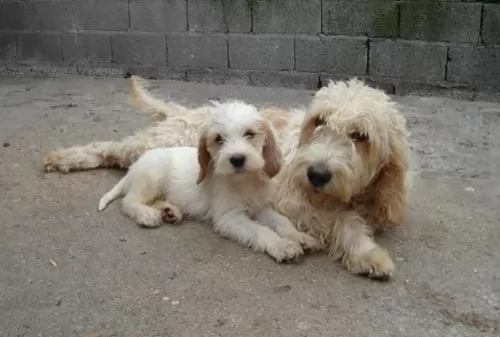 This medium sized dog is stocky and well proportioned. He looks very much like the Grand Griffon Vendeen only smaller. It is less muscular than other hound dogs and it holds its tail up when working. The head is short with a medium/long muzzle. It has low set ears and a flat skull with large, dark eyes and pronounced eyebrows. It also has a mustache.
This medium sized dog is stocky and well proportioned. He looks very much like the Grand Griffon Vendeen only smaller. It is less muscular than other hound dogs and it holds its tail up when working. The head is short with a medium/long muzzle. It has low set ears and a flat skull with large, dark eyes and pronounced eyebrows. It also has a mustache.
 Today’s St. Bernard is not a large dog, he is a giant dog. Weighing in at 140-200 pounds and standing 28 to 35 inches tall, he is a lot of dog. Bred with mastiffs and large mountain dogs, they have proportional and powerful build. They are strong, sturdy and well muscled. They have either a smooth or rough (short or long) coat. Their eyes are brown or occasionally blue. They have tight lids, and square heads and muzzles.
Today’s St. Bernard is not a large dog, he is a giant dog. Weighing in at 140-200 pounds and standing 28 to 35 inches tall, he is a lot of dog. Bred with mastiffs and large mountain dogs, they have proportional and powerful build. They are strong, sturdy and well muscled. They have either a smooth or rough (short or long) coat. Their eyes are brown or occasionally blue. They have tight lids, and square heads and muzzles.
There are two coat types called smooth and rough, or short and long. The smooth shorter coat is tough, flat and close against the body and the long, rough coat is dense, wavy and heavy around the legs, neck and ruff. Both types have long tails that hang low and are heavy. Saints are known to slobber, drool and snore.
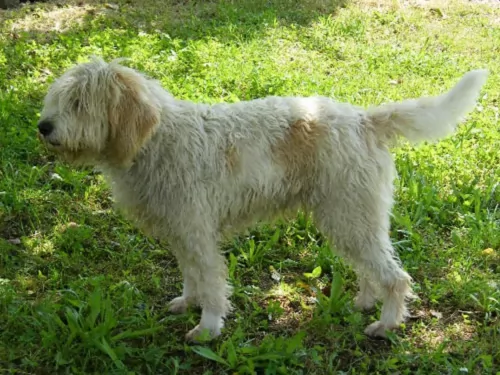 The Briquet Griffon Vendeen is a smart, attentive and sensitive dog. It is easy to train. They are loyal and bond quickly with their owner/trainer. These are enthusiastic dogs with a lot of stamina and get along with dogs and children. They don’t like to be told what to do. They respond well if you bribe them with treats or play with them. They are patient, extroverted and happy dogs.
The Briquet Griffon Vendeen is a smart, attentive and sensitive dog. It is easy to train. They are loyal and bond quickly with their owner/trainer. These are enthusiastic dogs with a lot of stamina and get along with dogs and children. They don’t like to be told what to do. They respond well if you bribe them with treats or play with them. They are patient, extroverted and happy dogs.
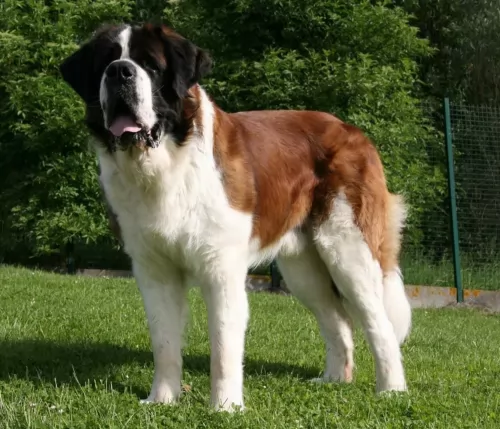 3.Adaptability no - these are giant dogs that need a lot of room. A large fenced yard or farm is best. They won’t do well in an apartment. They need exercise every day and loping around a yard is very good for them. They love to play in the snow, carry a backpack or pull a cart. They love to have a “job”
3.Adaptability no - these are giant dogs that need a lot of room. A large fenced yard or farm is best. They won’t do well in an apartment. They need exercise every day and loping around a yard is very good for them. They love to play in the snow, carry a backpack or pull a cart. They love to have a “job”
4.Learning ability – They are smart and highly trainable if motivated. They may appear lazy but they are just laid back and need a motivation.
 They are bred to be healthy and hardy, but still have some health concerns. These include:
They are bred to be healthy and hardy, but still have some health concerns. These include:
This is a frightening disease if you find your dog has it. It is characterized by a high fever and an intense hypersensitivity to touch. Aseptic Meningitis is an inflammation of the brain. It is caused by an infection and the most common ones include:
 The first problem this breed faces is how fast they grow and gain weight. This can lead to serious health issues if not controlled. Their bones can be damaged by this excessively fast rate of growth. Other issues facing the breed include:
The first problem this breed faces is how fast they grow and gain weight. This can lead to serious health issues if not controlled. Their bones can be damaged by this excessively fast rate of growth. Other issues facing the breed include:
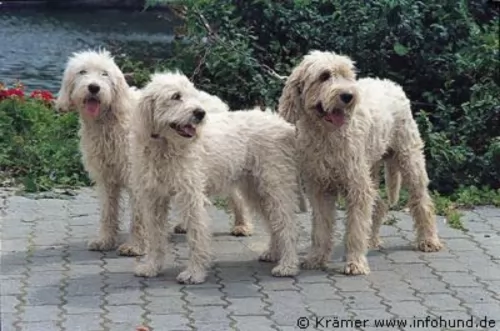 Don’t overfeed your Briquet Griffon Vendeen. Give her at least 2 meals of high quality dry food – two and one half to three cups daily.
Don’t overfeed your Briquet Griffon Vendeen. Give her at least 2 meals of high quality dry food – two and one half to three cups daily.
Every type of Griffon is a strong hunter and has strong instincts. The Briquet is no different. They need to be able to hunt as this is one of the strongest of scent hounds. They need a fenced in yard at the very least to explore and smell. They also enjoy long walks with new smells. Stay in shape because your Briquet Griffon Vendeen has stamina to share.
They love to play in leu of hunting. The games they love include frisbee, retrieving balls, and learning new tricks. They need mental stimulation as well as physical.
 1.Feeding the puppy – You want to control their growth. Do not overfeed, and make sure they exercise but not too much. Feed a high quality large breed puppy food 3-4 X a day in small amounts.
1.Feeding the puppy – You want to control their growth. Do not overfeed, and make sure they exercise but not too much. Feed a high quality large breed puppy food 3-4 X a day in small amounts.
2.Feeding the adult – The problem you face with he adult St. Bernard is the potential for Bloat. Don’t over feed. Don’t feed before or after strenuous exercise. Feed 2-3 X a day in smaller amounts to prevent Bloat. Feed a high quality breed specific food if possible or an extra large breed formula.
4. Games and Exercises They need exercise but not as much as you might think. The St. Bernard is a laid back lumbering character so don’t over exercise her. They enjoy weight and cart pulling but they are not athletes who enjoy frisbee or agility. Search and rescue trials and tracking trials are perfect athletic endeavors for them.